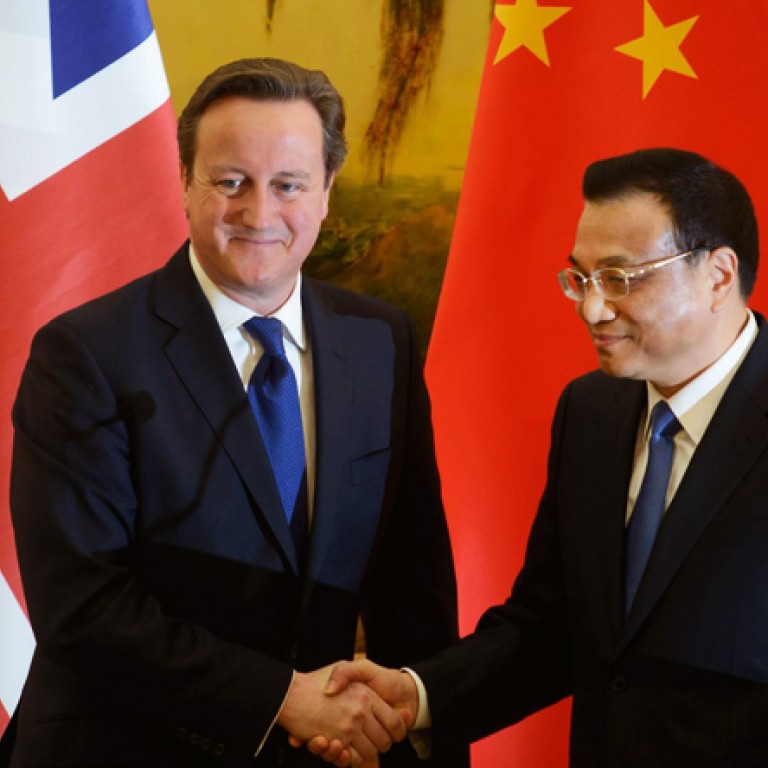
China scraps human rights talks with Britain, cites its internal affairs
Dialogue with Britain - which had been hailed by Cameron - is cancelled after China accuses London of making irresponsible comments
China has cancelled this week's bilateral human rights dialogue with Britain, which Prime Minister David Cameron highlighted as one of the "important achievements" of his high-profile trip to Beijing last year.
Beijing accused London of making irresponsible comments and using human rights issues to interfere in its internal affairs.
Cameron had cited the resumption of the dialogue this spring as one of the successes of his December visit, which followed a diplomatic freeze due to his meeting with the Dalai Lama in 2012.
A British Foreign Office spokesman said: "We are disappointed that the Chinese government unilaterally postponed the dialogue, which was due to take place on April 16. It is not for us to say why it was postponed.
Equality and mutual respect is the essential basis for … dialogue
"We are now in discussion to agree new dates for the dialogue. We consider the dialogue to be an important part of our bilateral relationship with China. It was agreed at the last UK-China summit in December 2013 by the prime minister and Premier Li Keqiang ."
In Beijing, the foreign ministry said: "The principle of equality and mutual respect is the essential basis for China and the UK to carry out dialogue and communication on human rights.
"The UK should stop making irresponsible comments and using human rights issues to interfere in China's internal affairs, to create the conditions for the human rights dialogue between China and the UK in the next round."
The British Foreign Office describes the dialogue as one of the main pillars of Britain's engagement with China on human rights.
The Tibet Society said in a blogpost that it understood that China did not agree with the agenda put forward by London and was angered by Britain's role at the recent UN Human Rights Council meeting about China's human rights record.
London is thought to have become involved in disputes between China and NGOs at the sessions. Chinese diplomats attempted to block a call by NGOs for a minute's silence in memory of the Chinese rights activist Cao Shunli , who died in custody on March 14.
Cao was stopped en route to Geneva to participate in a human rights training programme in September, and formally arrested a month later for "picking quarrels and provoking trouble".
China's foreign ministry has described the criticism as "mistaken", adding that the 52-year-old's rights had been ensured and that she received "conscientious and proactive treatment".
In 2010, Beijing indefinitely postponed the dialogue shortly after London criticised it over the execution of British citizen Akmal Shaikh, who had smuggled drugs but was believed to have serious mental health problems.
However, it is thought that other issues may have been involved in the decision.
China has also repeatedly suspended its bilateral dialogue with the United States.
Nicholas Bequelin, senior Asia researcher at Human Rights Watch, said: "China is responding to a critique of its shortcomings on human rights by cutting back further on human rights engagement.
"I don't think that indicates that China is genuinely committed to the outcomes of this dialogue … China is trying to intimidate its international partners by walking away from the table."
Last year, submitting evidence to the foreign affairs select committee on the role of human rights in Britain's policy towards China, Human Rights Watch said: "While supportive of the principle of dialogue, Human Rights Watch is concerned that the UK/China Human Rights Dialogue appears to have delivered very little tangible improvement … What is there to show for all of those hours of discussion?
"We are also concerned that the existence of the dialogue allows ministers to say that human rights issues are being dealt with there, as opposed to being raised in meetings between foreign ministers or heads of state."
